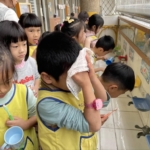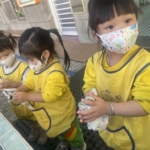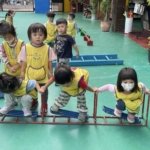By allowing infants to develop good hygiene habits from an early age, they can naturally internalize good habits and maintain good health.
The importance of teaching hygiene habits to infants and toddlers from an early age is twofold:
1. Prevent the occurrence of diseases and their transmission to others.: Bacteria and viruses lurking in the human body and the environment can easily enter the body when not paying attention, and good hygiene practices can prevent the spread of disease.
2. Develop correct and regular living habits.: Habits have to be developed, and as a parent, you have the responsibility to teach them. Good hygiene is a routine that needs to be nurtured from a young age.
Babies and young children need to learn different knowledge and behaviors through imitation during their growth process, and routine is one of the most basic aspects of life, and hygiene is one of them. When a child learns good habits, he or she can use them for the rest of his or her life. Therefore, parents should give their babies correct concepts of hygiene from an early age and help them develop good hygiene habits.
Important hygiene habits that infants and toddlers should learn include the following seven:
- Hands: Keep them clean and wash them properly.
- Mouth: Rinse your mouth and brush your teeth often.
- Body: Daily bathing and regular cleansing.
- Nails and Hair: Keep them clean and properly trimmed.
- Sneeze and cough etiquette: Don't blow, don't splash, and wrap and discard used toilet paper.
- Proper toileting habits: keeping clean and disposing of feces properly.
- Rooms and toys: keep them neat and clean.
In conclusion, good hygiene habits start at a young age, and parents need to demonstrate correctly, instruct patiently, supervise strictly, and encourage positively. Remember to give positive encouragement and motivation to your child when he/she is doing the right thing, so that he/she can develop good hygiene habits gradually.
Improvement of inappropriate habits while establishing good hygiene practices
Research has shown that it is easier to remove a bad habit than to establish a new one, but it is easier to get results by doing both at the same time. For example, if a child does not like to wash his/her hands, in addition to frequently reminding and informing the child of the situations (e.g., before and after meals) in which hand washing is necessary, the child should also be made aware of the negative consequences of not washing his/her hands, including skin infections and the spread of diseases, etc. Furthermore, parents can demonstrate the correct hand washing actions in different situations, both cognitively and behaviorally, and allow the child to imitate the actions and thus establish a habit, as well as making use of information and pictures on the Internet to clearly understand the positive effects of careful hand washing on health. Parents can also make use of the information and pictures on the Internet to clearly understand the positive effects of serious hand washing on health.
Parents need to set a good example for good hygiene practices.
Parents should set a good example to guide their children to pay attention to personal hygiene. Since viruses and bacteria are invisible, it is important to reinforce the concept that "illnesses come in through the mouth", for example, washing hands before eating, washing hands after each visit to the toilet, and washing hands after returning home from the outside world, etc. Parents and children should do this together, so that hand-washing habits can be developed naturally and easily.
Secondly, children should be taught to pay attention to the hygienic environment of food and drink, including the space, tables and chairs, crowds, freshness of food, and so on. Reduce eating out as much as possible, and choose clean and tidy stores, don't buy things from roadside stalls, and don't buy unpackaged or non-expiry date beverages to minimize the chances of illnesses coming in through the mouth.
In addition, it is also necessary to develop the habit of active cleaning and organizing from a young age, starting with the training of tidying up their own toys, requiring a fixed location and neat and clean, so that everything has a fixed location, parents and children together to discuss how to organize the housework, as well as the division of labor, are all ways to cultivate good habits.
Parents' efforts to teach and personally demonstrate is very important, but also by the older siblings with younger siblings to do together, the whole family can be more cohesive centripetal force, the children can also learn to share experience and share the responsibility to teach children to develop good hygiene habits!





